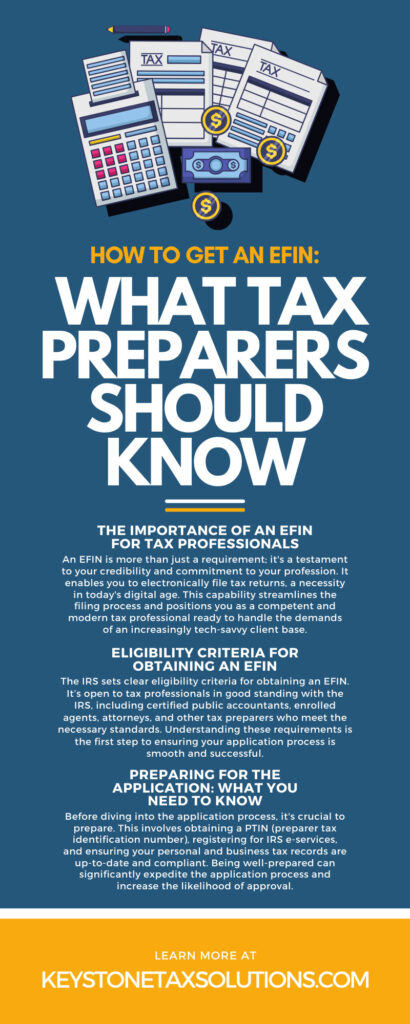Navigating the path to obtaining an electronic filing identification number (EFIN) is a crucial step for any tax preparer intending to file returns electronically. Read here to learn what tax preparers should know about how to get an EFIN.
The Importance of an EFIN for Tax Professionals
An EFIN is more than just a requirement; it’s a testament to your credibility and commitment to your profession. It enables you to electronically file tax returns, a necessity in today’s digital age. This capability streamlines the filing process and positions you as a competent and modern tax professional ready to handle the demands of an increasingly tech-savvy client base.
Eligibility Criteria for Obtaining an EFIN
The IRS sets clear eligibility criteria for obtaining an EFIN. It’s open to tax professionals in good standing with the IRS, including certified public accountants, enrolled agents, attorneys, and other tax preparers who meet the necessary standards. Understanding these requirements is the first step to ensuring your application process is smooth and successful.
Preparing for the Application: What You Need To Know
Before diving into the application process, it’s crucial to prepare. This involves obtaining a PTIN (preparer tax identification number), registering for IRS e-services, and ensuring your personal and business tax records are up-to-date and compliant. Being well-prepared can significantly expedite the application process and increase the likelihood of approval.
The Application Process: A Step-by-Step Overview
The application process for an EFIN involves several key steps. First, create an account on the IRS e-services portal. Next, complete the online application, which includes providing information about your tax preparation business and consenting to a suitability check. The application must be thorough and accurate, as discrepancies can lead to delays or rejection.
Understanding the Background Check and Fingerprinting Requirements
The IRS mandates a thorough background check when you apply for an EFIN, which may include fingerprinting, especially for applicants without a recent tax filing history. This step is crucial to ensure the applicant’s credibility and reliability. The IRS scrutinizes the applicant’s tax compliance history and any past legal issues related to tax filing to ensure the integrity of the tax professional.
Navigating Required Documentation for EFIN Application
Applicants need to gather essential documentation for the EFIN application, including personal identification (like a driver’s license or passport), business registration documents, and an employer identification number (EIN) for businesses. These documents are vital in establishing your identity and the legitimacy of your tax preparation business.
The IRS’s Review and Approval Process for EFIN
The IRS’s review process for an EFIN application is comprehensive and thorough. The IRS examines the applicant’s tax compliance history, ensuring there are no outstanding liabilities or issues. The review process can take up to 45 days, and responding promptly to any IRS requests for additional information is important.
Responsibilities and Best Practices for EFIN Holders
Holding an EFIN carries significant responsibilities. You are required to adhere to IRS standards and regulations, ensuring the integrity and security of the e-filing system. This includes maintaining the confidentiality of taxpayer information, reporting any changes in your application information, and safeguarding your EFIN against misuse.
Best practices include conducting regular security audits, training staff on compliance and ethical practices, and staying updated with IRS guidelines. Additionally, it’s vital to monitor the number of returns filed using your EFIN, as discrepancies can indicate unauthorized use, requiring immediate action to prevent fraud and protect your professional standing.
The Annual Ritual: Renewing and Updating Your EFIN
Renewing and updating your electronic filing identification number (EFIN) is an annual necessity that tax preparers must not overlook. Each year, you must verify and update your information with the IRS. This process involves checking the accuracy of your personal and professional details, including any changes in your business structure, address, or responsible parties.
Timely renewal ensures uninterrupted service, as an outdated EFIN can lead to suspension of your e-filing privileges. Setting reminders and allocating time each year to complete these updates is crucial, ensuring compliance and the continued ability to serve your clients efficiently.
Addressing Challenges in Obtaining an EFIN
Securing an EFIN isn’t without its challenges. Common hurdles include navigating the complex IRS e-services website, understanding the intricate details of the application process, and passing the suitability check, which involves a credit check, a tax compliance verification, and a criminal background check. Applicants might also face issues if they have had prior compliance problems with the IRS. Overcoming these challenges requires meticulous preparation, attention to detail, and, sometimes, professional guidance.
Safeguarding Taxpayer Data: A Responsibility with EFIN
With an EFIN comes the great responsibility of protecting taxpayer data. The IRS mandates strict adherence to data security protocols to prevent unauthorized access and data breaches. This includes securing your IT infrastructure, using robust encryption methods for data transmission, supplying regular training in data security for your staff, and adhering to the IRS’s guidelines on cybersecurity. Failure to adequately protect taxpayer data can result in penalties and loss of your EFIN privileges.
Boosting Your Tax Business With EFIN
Possessing an EFIN can significantly enhance your tax preparation business. It enables you to file returns electronically, leading to faster processing times and quicker refunds for clients, which enhances client satisfaction and retention. Additionally, it allows you to expand your client base, as many taxpayers now prefer, and sometimes even expect, e-filing as an option. Leveraging this capability in your marketing efforts can set you apart from competitors who don’t offer e-filing services.
Leveraging Web-Based Professional Tax Software With Your EFIN
In today’s digital era, web-based professional tax software has become a pivotal tool for tax preparers with an EFIN. This software offers many advantages, including real-time updates on tax laws, automated error checks, and seamless integration with IRS systems. Utilizing such platforms streamlines the tax filing process and enhances accuracy and efficiency.
It’s important to choose software that is IRS-approved and compatible with your EFIN, ensuring compliance and security. Additionally, these programs often provide valuable features like client management tools, e-signature capabilities, and comprehensive reporting, making them indispensable for modern tax practices.
Now that you know how to get an EFIN, you can confidently navigate the process as a professional tax preparer. An EFIN is more than just a requirement; it’s a key to enhancing your tax preparation business’s efficiency and credibility.



